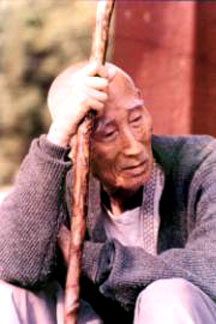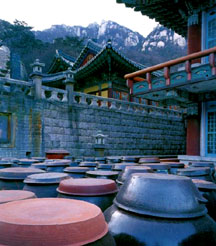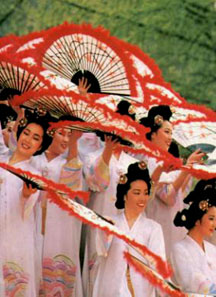
 Army Life 101 - There's
a special place in heaven for an Army Wife!
Army Life 101 - There's
a special place in heaven for an Army Wife!

 Army Wife 101
* The Army *Webring *
My Life * Korea
* Poems * Friend's Links
* Thanks
Army Wife 101
* The Army *Webring *
My Life * Korea
* Poems * Friend's Links
* Thanks 
A
Little About Korea
 The
Korean flag is called
t'aegukki. Its design symbolizes the principles of the yin and
yang in Oriental philosophy. The circle in the center is divided
into two equal parts. The upper red section represents the positive
cosmic forces of the yang. Conversely, the lower blue section
represents the negative cosmic forces of the yin. The two forces
together embody the concepts of continual movement and balance
and harmony that characterize the sphere of infinity. The circle
is surrounded by four trigrams, one in each corner. Each trigram
symbolizes one of the four universal elements: heaven, earth,
fire and water.
The
Korean flag is called
t'aegukki. Its design symbolizes the principles of the yin and
yang in Oriental philosophy. The circle in the center is divided
into two equal parts. The upper red section represents the positive
cosmic forces of the yang. Conversely, the lower blue section
represents the negative cosmic forces of the yin. The two forces
together embody the concepts of continual movement and balance
and harmony that characterize the sphere of infinity. The circle
is surrounded by four trigrams, one in each corner. Each trigram
symbolizes one of the four universal elements: heaven, earth,
fire and water.
 The
national flower of Korea
is the mugunghwa or Rose of Sharon. Every year from July or October,
a profusion of mugunghwa blossoms grace the entire country. Unlike
most flowers, mugungwha is remarkably tenacious and is able to
withstand both blight and insects. The flower's symbolic significance
stems from mugungwha's root, "mugung," meaning immortality.
This word accurately reflects the immortal nature of Korean history,
and the determination and perseverance of the Korean people.
The
national flower of Korea
is the mugunghwa or Rose of Sharon. Every year from July or October,
a profusion of mugunghwa blossoms grace the entire country. Unlike
most flowers, mugungwha is remarkably tenacious and is able to
withstand both blight and insects. The flower's symbolic significance
stems from mugungwha's root, "mugung," meaning immortality.
This word accurately reflects the immortal nature of Korean history,
and the determination and perseverance of the Korean people.
 Local
time
Local
time
GMT +09
Capital
Seoul
Language
Hangul (Korean)
Electricity
110/220V AC 60Hz
International Dialing Code
82
 Climate
Climate
January: -12 degrees Celsius to 8 degrees Celsius.
Winters are cold with occasional rain or snow. Autumn from September-November
is warm and clear, the most pleasant time of the year.
July: 17 degree Celsius to 32 degrees Celsius. Summers
are hot and humid, with half the  annual
rainfall occurring during the monsoon period between late Jun-Jul.
Spring is warm and runs from March-May.
annual
rainfall occurring during the monsoon period between late Jun-Jul.
Spring is warm and runs from March-May.
Clothing
Lightweights with rainwear in summer and light or
medium weights in spring and autumn. Heavy, warm clothing for
winter, particularly in view of the high wind-chill factor at
this time of the year.
Driving License
International Driving Permit required
Currency
Won (KRW) The won rate changes daily. For the current
won rate.
Notes
KRW: 1000, 5000, 10000
Coins
KRW 1, 5, 10, 100, 500
Credit Cards
Credit cards and travelers checks are widely accepted.
Here are some tips
that might help you enjoy your stay in Korea:
- Koreans often push and shove
their way through crowds, be it at the subway or in the market.
They consider it common practice and not rude. They won't stop
to say sorry or excuse me. Just remember: When in Rome, do as
the Romans….
- Korean drive much more aggressively
than Americans. The public transportation system is terrific!
- Most of the public restrooms
are floor-level traditional commodes which resemble drain holes.
Also, toilet paper is not available in all facilities, many venders
sell it. Your best bet is to carry some with you always.
- When flagging a cab or motioning
to a person never gesture with palm up or use finger gestures.
It is for animals and considered rude. Instead motion with palm
downward and waving up and down with an inward motion as if you
were motioning a car to slow down.
- Use both hands with a slight
bow when receiving or giving objects to or from your seniors or
elders.
- Koreans adore babies - especially
if they are blond or blue eyed. The Koreans may touch your children
without permission from you. They mean no harm.
- Koreans do not wait in line and
if a line forms elder Koreans will walk to the front. In the restroom
they will stand in lines at each booth instead of standing in
one line at the main door.
- Koreans exchange gifts on New
Years and Chusok. Do not forget to give gifts or money in an envelope
to your house gentleman or lady.
- Koreans are not as affectionate
in public as Americans tend to be. You may see young people holding
hands, but nothing more.
- .If you are invited to a Korean
home make sure your socks are clean and free of holes. You will
be expected to remove your shores when entering the house.
- Taxi drivers will sometimes pick
up one or more passengers going in the same direction. The driver
will charge each passenger separately.
- There is great respect to age
in the Korean culture. Always offer your seat to an elderly Korean.
- In a Korean meal rice, soup and
side dishes are served all at once. There is no main course. Sweet
desserts are not served, but tea or coffee and a seasonal fruit
often follow the meal.
- When dining with Koreans do not
use your fingers unless the host or another Korean guest uses
his fingers.
- Don't stand your spoon or chopsticks
upright in a bowl of rice. This is done when honoring the deceased
in memorial ceremonies.
- Tipping is not expected at small,
inexpensive Korean restaurants. However in the more modern and
fancy restaurants the food staff is accustomed to receiving a
tip. Most of the hotel restaurants include a 10% gratuity in the
bill.
- Koreans tend to dress more formally
than Americans. Women wear hose and dress shoes on a daily basis,
even with jeans.
- Avoid writing the name of a living
Korean in red ink. This is reserved for the deceased on the official
family register.

 Army Wife 101
* The Army *Webring *
My Life * Korea
* Poems * Friend's Links
* Thanks
Army Wife 101
* The Army *Webring *
My Life * Korea
* Poems * Friend's Links
* Thanks
I love

 my
guest book,
my
guest book,  who
else has been here!
who
else has been here!
This
page is hosted by  Get your own Free Homepage.
Get your own Free Homepage.


 Army Life 101 - There's
a special place in heaven for an Army Wife!
Army Life 101 - There's
a special place in heaven for an Army Wife!
 Army Wife 101
* The Army *Webring *
My Life * Korea
* Poems * Friend's Links
* Thanks
Army Wife 101
* The Army *Webring *
My Life * Korea
* Poems * Friend's Links
* Thanks 
 The
Korean flag is called
t'aegukki. Its design symbolizes the principles of the yin and
yang in Oriental philosophy. The circle in the center is divided
into two equal parts. The upper red section represents the positive
cosmic forces of the yang. Conversely, the lower blue section
represents the negative cosmic forces of the yin. The two forces
together embody the concepts of continual movement and balance
and harmony that characterize the sphere of infinity. The circle
is surrounded by four trigrams, one in each corner. Each trigram
symbolizes one of the four universal elements: heaven, earth,
fire and water.
The
Korean flag is called
t'aegukki. Its design symbolizes the principles of the yin and
yang in Oriental philosophy. The circle in the center is divided
into two equal parts. The upper red section represents the positive
cosmic forces of the yang. Conversely, the lower blue section
represents the negative cosmic forces of the yin. The two forces
together embody the concepts of continual movement and balance
and harmony that characterize the sphere of infinity. The circle
is surrounded by four trigrams, one in each corner. Each trigram
symbolizes one of the four universal elements: heaven, earth,
fire and water. The
national flower of Korea
is the mugunghwa or Rose of Sharon. Every year from July or October,
a profusion of mugunghwa blossoms grace the entire country. Unlike
most flowers, mugungwha is remarkably tenacious and is able to
withstand both blight and insects. The flower's symbolic significance
stems from mugungwha's root, "mugung," meaning immortality.
This word accurately reflects the immortal nature of Korean history,
and the determination and perseverance of the Korean people.
The
national flower of Korea
is the mugunghwa or Rose of Sharon. Every year from July or October,
a profusion of mugunghwa blossoms grace the entire country. Unlike
most flowers, mugungwha is remarkably tenacious and is able to
withstand both blight and insects. The flower's symbolic significance
stems from mugungwha's root, "mugung," meaning immortality.
This word accurately reflects the immortal nature of Korean history,
and the determination and perseverance of the Korean people. Local
time
Local
time  Climate
Climate
 annual
rainfall occurring during the monsoon period between late Jun-Jul.
Spring is warm and runs from March-May.
annual
rainfall occurring during the monsoon period between late Jun-Jul.
Spring is warm and runs from March-May.
 Army Wife 101
* The Army *Webring *
My Life * Korea
* Poems * Friend's Links
* Thanks
Army Wife 101
* The Army *Webring *
My Life * Korea
* Poems * Friend's Links
* Thanks
 Get your own Free Homepage.
Get your own Free Homepage.